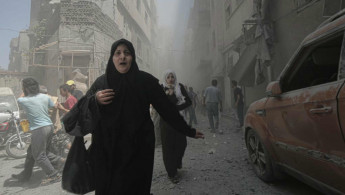Regime resumes Idlib air strikes after scrapping ceasefire
The northwestern region, which hosts some three million people, is one of the last major centres of resistance to President Bashar al-Assad's regime after eight years of war.
Damascus said Thursday it had agreed to a truce from Friday to halt three months of regime and Russian bombardment on the area, which has killed more than 790 civilians and pushed 400,000 people from their homes.
But jihadists running the region on Saturday refused to comply with a key condition to that truce, declaring they would never withdraw from a planned buffer zone around the area.
The Syrian Observatory for Human Rights said regime air strikes resumed on the region minutes after the truce was cancelled, before Russian planes joined in too.
Russian planes pounded the western edge of the enclave, while aircraft from both sides resumed bombardment of its southern flank, the Britain-based war monitor said.
Further south, the monitor said four civilians were killed in regime barrel bombings on the town of Morek in the northern Hama region, adding that these were the first civilian victims since the regime bombardments resumed.
Earlier, an AFP correspondent saw the wind blow plumes of white smoke across the fields after planes and helicopters pounded Khan Sheikhun town in the south of the region.
A few families fled the town in cars or trucks piled high with their belongings, women and children perched on top, the correspondent said.
Rebels will 'never withdraw'
Syria's military said it was scrapping the truce as "armed terrorist groups, backed by Turkey, refused to abide by the ceasefire and launched many attacks on civilians in surrounding areas", according to a statement carried by state news agency SANA.
It accused fighters in the region of launching a flurry of rockets at the Hmeimim air base near Syria's Mediterranean coast, causing "great human and material losses" nearby.
The Russian defence ministry said there had been no casualties on the base itself, but that, according to the Syrian security services, rockets fell on a nearby district, "wounding four residents".
Experts and residents had been sceptical that the truce would hold, citing several previous failed ceasefires.
Hayat Tahrir al-Sham, a jihadist group led by Syria's former Al-Qaeda affiliate, has since January controlled most of Idlib province as well as adjacent parts of the Hama, Aleppo and Latakia governorates.
Other rebels and jihadists are also present.
Idlib is supposed to be protected from a massive government offensive by a Turkish-Russian deal struck in September last year.
But that deal was never fully implemented as jihadists refused to withdraw from the planned demilitarised cordon.
On Saturday, HTS leader Abu Mohamed al-Jolani said his fighters would "never withdraw from the zone".
Memories in the rubble
Over the weekend, several civilians displaced by the bombardment had taken advantage of the ceasefire to return to their homes and inspect the damage.
In Khan Sheikhun, Abu Abdullah dug through the rubble of his bombed-out house, scavenging for the scant belongings he could salvage from the ruins.
Below mangled rods, the repairman dusted off a small ceramic statue of the Quran and retrieved some coffee cups from the rubble.
"I'm trying to collect some of the belongings we had, some of the memories we have left behind in this place" after leaving five months ago, he said.
By Monday, bombardment on his hometown -- nearly deserted in recent months -- had resumed.
While the ceasefire had halted air strikes on the region from Friday, both sides had continued to trade artillery and rocket fire.
On Sunday, regime rocket fire killed a woman inside the bastion, the Observatory said.
On Friday, jihadist rocket fire near Assad's ancestral village to the west killed a civilian, SANA said.
Humanitarian groups have repeatedly raised the alarm over recent Russian and regime bombardment of Idlib, fearing one of the worst disasters of Syria's war.
The conflict has killed more than 370,000 people and displaced millions since starting with the brutal repression of anti-Assad protests in 2011.
After a string of Russia-backed victories against rebels and jihadists since 2015, the Damascus regime today controls around 60 percent of the country.
But several areas remain beyond its reach: Idlib, nearby territory held by Turkey-backed rebels, and a large swathe of the country's oil-rich northeast held by US-backed Kurds.





 Follow the Middle East's top stories in English at The New Arab on Google News
Follow the Middle East's top stories in English at The New Arab on Google News


